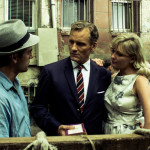THE TWO FACES OF FATES
Film Review

“The Two Faces of January” really deserves all the great response that it’s been receiving from audiences and the critics. It’s an elegant period thriller, a film of tidy precision and class. This film is the directorial debut of Hossein Amini, the British-Iranian screenwriter best-known for a his screenplay adaptations of novels: “Jude” and “Wings of the Dove.” The Two Faces of January is also an adaptation, from the Patricia Highsmith novel of the same name. Amini’s skill as a scenarist shines through in this three-person rollercoaster ride in the dark. The film is tightly engineered and doesn’t waste words. But it’s also a pleasure to look at and listen to, evoking many old-fashioned movie virtues, and showing us a lush but suspenseful good time. The production, shot in Greece and Turkey, is top notch in every way. The actors Viggo Mortensen, Oscar Isaac and Kirsten Dunst, are superbly subtle and nuanced in the roles they play.
The story opens in Athens at one of the world’s most clichéd tourist sights, the Parthenon. But it’s 1962 and things looked newer then. Rydal (Oscar Isaac), a good-looking young American ex-pat living in Greece, is playing tour guide to a group of college girls and always looking for ways to scam these hapless tourists out of some of their money. Chester McFarland (Viggo Mortensen) is not easy to warm up to at first glance. Much older than his pretty wife Colette (Kirsten Dunst), there’s an intelligence about him that allows him to size Rydal up on the spot, watching as the boy shamelessly short-changes one of the girls on his tour. Rydal tells the couple he’s a Yale grad who‘s in Europe while he tries to figure out what he wants to do in life. Chester says he’s an investment broker and hires the boy to take them around. Neither one seems particularly trustworthy, and the viewer takes note early on that both are con men just working different cons, and trying to con each other.
Rydal is both drawn to Colette’s beauty and impressed by Chester’s wealth and sophistication, Rydal gladly accepts their invitation to dinner. That’s when things start to get complicated and tangled when a private eye sent by the mob to track down Chester shows up at their hotel. A tense and dangerous battle of wits between the two men leads them from Greece to Turkey, and to a dramatic finale played out in the back alleys of Istanbul’s Grand Bazaar.
Among the cast, Dunst holds the least exciting role of the group, but Mortensen’s elegant Chester is a multilayered creation with a beautifully acted sense of moral ambiguity. Isaac shows a considerable amount of talent and maturity in this outstanding follow-up to his “Inside Llewyn Davis” performance, here showing a special skill for foreign languages. Director Amini knows how to work with his actors, tunneling beneath the surface of their characters and bringing them truthfully to the screen. The Spanish composer Alberto Iglesia’s dynamic score propelss the story through some of its slower moments, while Marcel Zyskind’s crisp cinematography, with its yellow and blue tones, yields a true visual delight in spite of the dark drama that unfolds in the film.
Another major plus for the film is its exotic atmosphere. It takes place in 1962, a time when you could still meet men like Chester who had been on the European front in World War II and returned as tourists. Add to that the seductive simplicity of Mediterranean life, with unguarded ruins where tourists are free to camp out overnight and dine on freshly caught octopus drying in the sun, and you have a setting unlike any other in which the story can be told.
The title is a play on the themes of duplicity and shifting circumstances, January being derived from the ancient god Janus, a symbol of beginnings and transitions, whose two faces look to the past and future. It is the fate or should I say fates of the characters to be caught between the past and the future, with little choice of how to escape the present and make happy lives for themselves. Director Amini has placed his characters like chess pieces on an dangerous board and like a master chess player, he has moved them helplessly to a triple check-mate.





